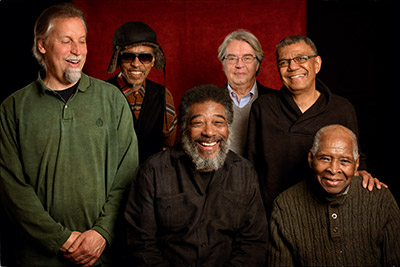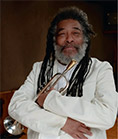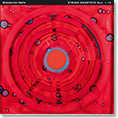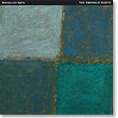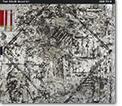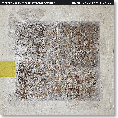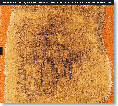THE MUSICIANS
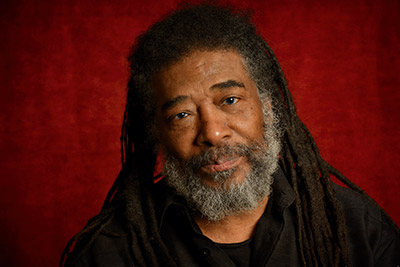
Wadada Leo Smith (b.1941) was born in Leland, Mississippi. Smith´s early musical life began in the concert and marching bands of Lincoln High School in Leland, first on the mellophone, then moving on to the French horn and finally receiving his first trumpet at the age of 12. At the same age, he composed a work for three trumpets, his first composition.
Smith received his initial musical education from his stepfather, Alex "Little Bill" Wallace, who was one of the first Delta blues singers to begin playing the electric guitar. His family home in Leland was a meeting place for musicians where blues artists such as Elmore James, B.B. King and Little Minton were frequent guests, often performing in the family´s living room. Accordingly, Smith has said that: "The Blues was my first language and it never went away." As a trumpeter, Smith considers himself a descendant of Louis Armstrong, although Miles Davis, Booker Little, Clifford Brown and, a bit later, Don Cherry had the strongest impact on his own playing as a young musician.
Smith´s formal music studies began with Oneal Jones and Henderson Howard, who were his school bandmasters at Lincoln High, with the latter also being his first trumpet teacher. Smith later studied in the U.S. Army Music Program at Fort Leonard Wood in Missouri (1963), the Sherwood School of Music in Chicago, Illinois (1967-69), and Wesleyan University in Middletown, Connecticut (1975-76).
Following high school, Smith travelled for about a year with various blues, rhythm ´n´ blues and soul groups before entering the U.S. Army. After attending the U.S. Army Music Program, Smith played for a total of about five years in six different army bands, touring not only in the Southern United States, but also in France and Italy. He also continued to broaden his musical horizons and was leading his own Ornette Coleman-inspired trio while still in the military. In 1967, Smith left the army and moved to Chicago to work with saxophonist Anthony Braxton and other members of the Association for the Advancement of Creative Musicians (AACM), the groundbreaking creative music collective that combined the music´s African roots with an improvisational approach.
Soon after arriving in Chicago, Smith met Anthony Braxton and violinist Leroy Jenkins for an impromptu session and, as a result, the three founded a collaborative group, Braxton, Jenkins and Smith (later expanded into a quartet with the addition of drummer Steve McCall and named Creative Construction Company although they never actually performed live either as a trio or as a quartet under that name). Braxton, Jenkins and Smith became one of the key early ensembles of the AACM. Smith´s other collaborators in the pioneering work of the AACM also included saxophonists Joseph Jarman, Roscoe Mitchell and Kalaparusha Maurice McIntyre, trumpeter Lester Bowie, trombonist George Lewis and pianist Muhal Richard Abrams, among others.
Smith´s first recordings were made in Chicago during this period with Anthony Braxton (with Braxton, Smith, Jenkins and Muhal Richard Abrams, 3 compositions of new jazz in 1968 and, with Braxton, Smith and Jenkins, Silence in 1969), Kalaparusha Maurice McIntyre (with McIntyre, Smith, saxophonist John Stubblefield, pianist Amina Claudine Myers, bassists Malachi Favors Maghostut and M´Chaka Uba, and drummer Thurman Barker, Humility In The Light Of The Creator in 1969) and Muhal Richard Abrams (with Abrams, Smith, Henry Threadgill, bassist Lester Lashley and Thurman Barker, Young At Heart, Wise In Time in 1969).
Braxton´s 3 compositions of new jazz and Silence also included Smith´s first recorded compositions, "The Bell" and "Silence," respectively. These two compositions already used the rhythm-units concept, a framework for improvisation that Smith developed more fully in the 1970s.
Smith´s own Ankhrasmation Symbol Language has been significant in his development as an artist and educator. Smith published his music philosophy in the early 1970s in notes (8 pieces), source a new world music: creative music (Kiom Press, 1973). Notes (8 pieces) has been translated into Japanese (1976), Italian (1981) and Icelandic (2018). An expanded edition of the work in English was published in 2015.
As part of his music theory, Smith developed the two basic systems of music that he has utilized in his compositions ever since: the system of rhythm-units and the notation system he termed "ahkreanvention," which literally means to create and invent musical ideas simultaneously, utilizing the fundamental laws of improvisation and composition. With the rhythm-unit concept, each single sound or rhythm, or a series of sounds or rhythms, is accepted as a complete piece of music. Each performer, in turn, is considered as a complete unit with each having his or her own center from which each performs independently of any other, whether performing in a small group or in an orchestral context. The independence of each sound-rhythm and the independence of each performer contributes to the liberation from time as a period of development and to its employment as an element of space instead.
Like many other AACM members, Smith supported himself in Chicago by playing in the horn sections of various rhythm ‘n´ blues and soul bands, including blues singer and guitarist Little Milton Campbell´s group. In 1969, Smith turned down Little Milton´s offer to become the straw-boss of his road band and moved to Paris along with Anthony Braxton and Leroy Jenkins as well as a few other key members of the AACM. During his year in Paris, Smith took part in two important recordings by Braxton and continued to perform and record with Braxton throughout the 1970s. Since that time, Braxton and Smith have continued to play together from time to time.
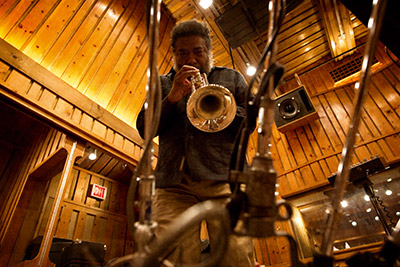
After returning from Paris, Smith led his own group, Integral, with saxophonist Henry Threadgill, trombonist Lester Lashley and drummer Thurman Barker, for a few months in Chicago before settling in New Haven, Connecticut, during the summer of 1970 for a period of ten years. In New Haven, Smith concentrated on his own music as well as studying and teaching rather than touring and recording all over the world like many of his compatriots. In addition to leading his own groups and teaching at the University of New Haven, he studied ethnomusicology at the Wesleyan University, focusing on West African, Japanese, Indonesian and Native American music cultures. Soon after arriving in New Haven, Smith organized the Creative Improvisation Ensemble with saxophonist Marion Brown and the duo also recorded an album in December 1970 in New York City (Creative Improvisation Ensemble/Duets).
Smith´s first recording as a leader was a solo album (Creative Music-1: Six Solo Improvisations in 1971), which was the first album released on Kabell, the independent record label he founded. After this first solo recording, Smith has continued to perform solo concerts and has released several additional solo albums (Red Chrysanthemums Solos in 1977, Solo Music/Ahkreanvention in 1979, Kulture Jazz in 1992 and Red Sulphur Sky in 2001). In 2015, Smith featured his solo trumpet on four classic Thelonious Monk compositions and four new compositions by Smith inspired by Monk (Solo: Reflections And Meditations On Monk, TUM CD 053). Smith´s most recent solo trumpet recording is Trumpet, a three-CD boxed set that features fourteen compositions by Smith, including four extended multi-part works, recorded at a medieval stone church in the town of Pohja, on the Southern Coast of Finland (TUM BOX 002 in 2016).
Smith´s principal ensemble in New Haven, New Dalta Akhri, was comprised of his students and other young musicians based in the area and recorded a number of albums (Reflectativity in 1974, Song Of Humanity in 1976, The Mass Of The World in 1978, Divine Love in 1978, Spirit Catcher in 1979 and Go In Numbers in 1980). At various times, its members included saxophonists Dwight Andrews, Oliver Lake and Henry Threadgill, pianist Anthony Davis, vibraphonist Bobby Naughton, guitarist Michael Gregory Jackson, bassist Wes Brown and drummer Pheeroan akLaff. Members of New Dalta Akhri were also part of the two large orchestras responsible for Smith´s first big band recordings, Leo Smith Creative Orchestra (Budding Of A Rose in 1979) and Creative Improvisors Orchestra (The Sky Cries The Blues in 1981).
In the early 1980s, Smith recorded a series of albums that reflected the spirituality of Rastafarianism, including Procession Of The Great Ancestry and Rastafari in 1983. The music that Smith performed around this time sometimes featured lyrics inspired by Rastafarianism and introduced elements of fusion jazz, reggae, funk and the blues into the music. Smith also became increasingly interested in presenting multimedia performances incorporating song, dance and drama.
In 1986, Smith began a series of duo releases with drums/percussion by recording a live concert with drummer Ed Blackwell (The Blue Mountain´s Sun Drummer, released on Smith´s Kabell label in 2010). This series includes duo recordings with Sabu Toyozumi (Burning Meditation in 1994), Adam Rudolph (Compassion in 2002), Günter "Baby" Sommer (Wisdom In Time in 2006), Jack DeJohnette (America in 2008) and Louis Moholo-Moholo (Ancestors, TUM CD 029, in 2011). Smith has also made a number of other duo recordings, including those with Anthony Braxton (Organic Resonance and Saturn, Conjunct The Grand Canyon In A Sweet Embrace, both in 2003), bassist John Lindberg (Celestial Weather, TUM CD 046, in 2012), pianist Angelica Sanchez (Twine Forest in 2013), sound designer Hardedge (The Nile in 2014) and pianist Vijay Iyer (A Cosmic Rhythm With Each Stroke in 2015), among others. Sacred Ceremonies, a three-CD boxed set, comprises a duo CD featuring Smith with drummer/percussionist Milford Graves, a duo CD featuring Smith with bassist Bill Laswell and a trio CD featuring Smith, Laswell and Graves (TUM BOX 003 in 2015/2016).
In 1992, Smith accepted a teaching position at the California Institute of the Arts (CalArts) and made Southern California his home. Alongside teaching, Smith continued to lead his own groups, in particular N´Da Kulture, and recorded a number of highly acclaimed albums as a leader (e.g., Tao-Njia in 1995, Golden Hearts Remembrance in 1997, Light Upon Light in 1998, Reflectativity in 2000 and Luminous Axis in 2002). In the mid-1990s, Smith converted to Islam, which further strengthened and made more apparent his longstanding interest in the musical cultures of the East, including those of Japan and India.
After moving to California, Smith began performing and recording more with musicians based on the West Coast, including guitarist Henry Kaiser in Yo Miles!, a group co-led by Kaiser and Smith and dedicated to the music of Miles Davis´ electric period (Yo Miles! in 1998 as well as Upriver and Sky Garden in 2001), among many others. He also continued his occasional collaborations with his old comrades from the AACM, including Anthony Braxton, Douglas Ewart (visionfest - visionlive in 2002 and Velvet Fire in 2009) and Roscoe Mitchell (The Bad Guys in 2000), as well as many others, including saxophonist John Zorn (with Zorn, Smith and Susie Ibarra, Birthday Series 50/8 in 2003 and, with Zorn, Smith and George Lewis, Sonic Rivers in 2013) and bassist John Lindberg (The Catbird Sings in 1999 and A Tree Frog Tonality in 2000).
In recent years, Smith has led five principal ensembles of his own: the Golden Quartet, an all-star group that originally included pianist Anthony Davis, bassist Malachi Favors Maghostut and drummer Jack DeJohnette and, in later editions, pianist Anthony Davis, Vijay Iyer or Angelica Sanchez, bassist John Lindberg and drummer Pheeroan akLaff or Ronald Shannon Jackson (Golden Quartet in 2000, The Year Of The Elephant in 2002, Tabligh in 2005 and, expanded into the Golden Quintet with drummer Don Moye, Spiritual Dimensions - CD1 in 2008, or with cellist Ashley Walters, America´s National Parks in 2016); the Great Lakes Quartet, another all-star group with Henry Threadgill, John Lindberg and Jack DeJohnette (The Great Lakes Suites, TUM CD 041-2, in 2012); Mbira, a trio with pipa player Min Xiao-Fen and Pheeroan akLaff (Dark Lady Of The Sonnets, TUM CD 023, in 2007); Organic, a larger group with instrumentation consisting primarily of electric string instruments (Spiritual Dimensions - CD2 in 2009 and Heart´s Reflections in 2010); and the Silver Orchestra, a large orchestra that recorded its first album in 2004 (Lake Biwa).
After retiring from CalArts in 2013, Smith again settled in New Haven and has focused on composing and performing more than ever before during his career. He has also reconnected with many of the East Coast musicians he has worked with in the past, including two weeklong residences with multiple ensembles at the Stone. In April 2017, Smith organized the CREATE Festival in New Haven, which featured a total of eight ensembles over two days, followed by a two-day festival in San Francisco in December 2017 and the second and third annual CREATE Festival in New Haven in April 2018 and April 2019.
Smith has been a prolific composer throughout his career with works ranging from solo piano pieces to compositions for multiple orchestras. Already while in the military in the 1960s, Smith arranged both popular and classical music for the various military bands in which he played and increasingly also began composing his own music both for jazz groups and for other ensembles. By the time Smith moved to Chicago in 1967, he had already composed several works for a string quartet or larger orchestras. When working with other members of the AACM, and in the large ensembles led by Muhal Richard Abrams and others in particular, Smith began to combine his compositional skills and the improvisational spirit of the early AACM ensembles in search of his own approach to orchestral music.
Smith´s music for large ensembles has been performed throughout the world since 1969, developing from early works for more traditional big bands to compositions for multi-ensembles. Smith has received a number of awards and commissions as a composer and his compositions have been performed by numerous contemporary music ensembles, including the AACM Orchestra, the Kronos Quartet, the Da Capo Chamber Players, the New Century Players, the San Francisco Contemporary Music Players, the Contemporary Chamber Players (University of Chicago), the S.E.M. Ensemble, Southwest Chamber Music, the Del Sol String Quartet, the New York New Music Ensemble, ne(x)tworks, the California E.A.R. Unit, the Oxford Improvisers Orchestra, Orkiestra Symfoniczna NFM (Wroclaw) and the Jack Quartet, among others.
For over two decades, Smith has been creating music for multiple ensembles. Some of these works take several days to perform. "Ten Freedom Summers" was premiered by the Golden Quartet and Southwest Chamber Music at the Roy and Edna Disney/CalArts Theater (REDCAT) in Los Angeles over three nights in October 2011. "Tabligh" for double-ensemble was performed by the Golden Quartet and the Classical Persian Ensemble at Merkin Concert Hall in New York City in 2006 and by the Golden Quartet and Suleyman Erguner´s Classical Turkish Ensemble at Akbank Music Festival in Istanbul in 2007. Smith´s largest work to date, "Odwira" for 12 multi-ensembles (a total of 52 instrumentalists), was premiered at the California Institute of the Arts in March 1995.
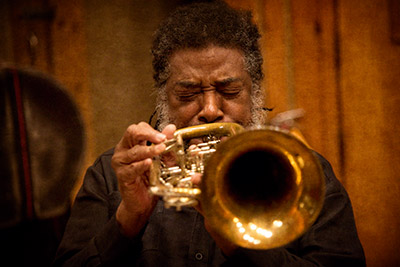
In 2012, Smith released his most extensive recording to date, Ten Freedom Summers, a four-CD collection of a total of 19 works composed over a period of 34 years and inspired by the civil rights movement in the United States. Ten Freedom Summers was recorded by the Golden Quartet (Smith, Anthony Davis, John Lindberg and Pheeroan akLaff) and the Golden Quintet (add drummer Susie Ibarra) together with Southwest Chamber Music and was a finalist for the Pulitzer Prize in Music.
In 2013, Smith released another important recording of works for a large ensemble, Occupy The World (TUM CD 037-2), a two-CD collection comprised of six extended compositions performed by Smith with TUMO, a 22-member orchestra.
In 2016, Smith released America´s National Parks, a two-CD recording by the Golden Quintet that features six extended compositions celebrating America´s national parks and its culture and, in 2017, Najwa (TUM CD 049) that features four compositions in tribute to past masters of creative music, Ornette Coleman, John Coltrane, Ronald Shannon Jackson and Billie Holiday, as well as the title composition, all performed by a group that includes Smith´s trumpet with four electric guitars, electric bass, drums and percussion.
In 2018, Smith released a recording of an extended composition dedicated to the civil rights icon Rosa Parks, "Rosa Parks: Pure Love. An Oratorio of Seven Songs," which features three vocalists, a string quartet, a trumpet quartet, electronics and a drummer as well as pre-recorded musical excerpts (TUM CD 057). An early version of "Rosa Parks: Pure Love" was premiered in 2016 at The New School in New York City as part of the program for the Festival of New Trumpet Music and the full version was performed four times over three successive days in April 2019 at The Kitchen in New York City, featuring also video in live performance and a butoh dancer.
Smith has been on the faculty of the University of New Haven (1975-76), The Creative Music Studio in Woodstock, New York (1975-78), and Bard College in Annandale-on-Hudson, New York (1987-92). In 1992-2013, he served as the director of the African-American Improvisational Music Program at The Herb Alpert School of Music at CalArts.
In 2016, Smith received the Doris Duke Artist Award and an honorary Doctorate of Arts degree from CalArts, where he was celebrated as Faculty Emeritus. In 2016, Smith also received the Mohn Award for Career Achievement honoring brilliance and resilience from the Hammer Museum at the University of California, Los Angeles (UCLA). In November 2019, Smith received the UCLA Medal, the campus´s highest honor, and, in February 2021, he received the United States Artists Fellowship.
Wadada Leo Smith´s Ankhrasmation Symbol Language Art Scores have been exhibited at several major American museums. In October 2015, The Renaissance Society at The University of Chicago presented the first comprehensive exhibition of the Ankhrasmation Symbol Language Art Scores. In 2016, a number of the scores were featured in the Hammer Museum´s "Made in L. A." exhibition in Los Angeles. Smith´s scores have also been shown at the Kalamazoo Institute of Arts in Michigan in 2016-17 and the Kadist Art Foundation in San Francisco, California, in 2016-17.
...
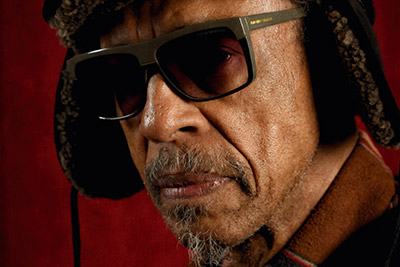
Henry Threadgill (b.1944) was born on the South Side of Chicago, Illinois, and grew up surrounded by music of various kinds - classical, jazz, gospel and blues. His extended family included an aunt, who studied classical piano and voice, and an uncle, Nevin Wilson, who played bass in pianist Ahmad Jamal´s trio.
Threadgill attended Chicago´s Englewood High School with the likes of future AACM members Steve McCall and Roscoe Mitchell. At Englewood, Threadgill played percussion and clarinet in the school band. At the age of 16, he began playing first the tenor and then the baritone saxophone, inspired by local saxophonists, such as Gene Ammons, John Gilmore, Eddie Williams and later also Von Freeman and Clifford Jordan. As a teenager, Threadgill regularly attended rehearsals and performances by the Sun Ra Arkestra.
After high school, Threadgill played with Veterans of Foreign Wars (VFW) marching bands in parades, as well as with blues, mariachi, gospel and polka bands. He attended Wilson Junior College, where he met musicians who later joined the AACM, including Anthony Braxton, Ari Brown, Malachi Favors, Joseph Jarman and Roscoe Mitchell. Jack DeJohnette, Betty Dupree, Bunky Green and Eddie Harris were also students at Wilson. Although idolizing Sonny Rollins, John Coltrane and Ornette Coleman, Threadgill was also impressed by Fritz Reiner´s Chicago Symphony Orchestra and influenced by classical avant-garde composers, such as Luciano Berio.
Threadgill and others soon joined Muhal Richard Abrams´ music workshop, which became known as the Experimental Band and laid the groundwork for the AACM. Every member was expected to compose music, with a part for every musician in the ensemble, regardless of instrument. Threadgill recalls first creating a piece for the Experimental Band around 1962.
After Wilson Junior College, Threadgill first attended the Governors State University and then the American Conservatory of Music in Chicago, where he studied piano with Gail Quillman and composition with Stella Roberts, among others, and received a degree in flute performance and composition.
In 1963 and 1964, Threadgill toured the United States with Philadelphia-based evangelist Horace Shepherd. In the late 1960s, he also toured with gospel singer Jo Jo Morris.
Threadgill was among the earliest members of the AACM, which was founded in May 1965. However, like many of his AACM colleagues, Threadgill had to leave Chicago for military service in 1966. He first worked in the U.S. Army as a musician and arranger but was then sent to serve in Vietnam where he joined the 4th Infantry Division Band. Threadgill returned to Chicago in 1968 after being injured during the TET offensive on his way back from guard duty. He joined the AACM Big Band and also worked with Philip Cohran, one of the AACM´s original founders. He stayed briefly in New York City in 1969, but soon returned to Chicago, where he recorded for the first time with Muhal Richard Abrams´s quintet that also included Wadada Leo Smith (Young At Heart, Wise In Time) that same year.
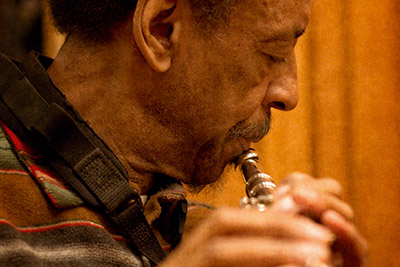
Since the early 1970s, Threadgill has focused on composing for and leading his own groups. The first of these was Air, a collaborative trio with bassist Fred Hopkins and drummer Steve McCall. With Air, Threadgill played saxophones and the hubkaphone, a found-sound percussion instrument that he had built out of hubcaps. Initially called Reflection, the trio was formed for the 1971 centennial celebration of ragtime composer Scott Joplin´s birth. The trio renamed itself Air after moving in 1975 to New York City, where many of the other AACM members had also moved.
Air toured widely and recorded nine albums mostly comprised of Threadgill´s compositions (Air Song in 1975, Live Air and Air Raid in 1976, Air Time in 1977, Open Air Suite and Montreux Suisse Air in 1978, Air Lore in 1979, Air Mail in 1980 and 80° Below ‘82 in 1982). Perhaps, the best known of these is Air Lore, which, in a return to the music´s roots, included arrangements of Scott Joplin rags and two Jelly Roll Morton compositions. A reconfigured trio, New Air (with Pheeroan akLaff replacing McCall on drums), recorded two albums in the mid-1980s (New Air: Live At Montreal International Jazz Festival in 1983 and Air Show No. 1 with Cassandra Wilson in 1986).
In New York City, Threadgill also embarked on various larger-scale projects under his own name. The first of these was X-75, which included four woodwinds (Threadgill, Douglas Ewart, Joseph Jarman and Wallace Laroy McMillan), four basses (Fred Hopkins, Leonard Jones, Rufus Reid and Brian Smith) and a vocalist (Amina Claudine Myers). The group released only one album, X-75 Volume 1 (1979), although Volume 2 has subsequently been released in a Mosaic boxed set (The Complete Novus & Columbia Recordings of Henry Threadgill & Air).
In addition to his own projects, Threadgill worked extensively with a number of other groups, including the David Murray Octet (Ming in 1980, Home in 1981 and Murray´s Steps in 1982) and Bill Laswell´s collective, Material (Memory Serves in 1981 and The Third Power in 1991), as well as various other projects associated with Laswell. During this period, he also recorded with Chico Freeman (Morning Prayer in 1976), Roscoe Mitchell (Nonaah in 1977 and L-R-G in 1978), Anthony Braxton (For Trio in 1977), Muhal Richard Abrams (I-OQA+19 in 1977), Frank Walton (Reality in 1978), Douglas Ewart (Angles Of Entrance in 1990), Leroy Jenkins (Themes And Improvisations On The Blues in 1992) and Billy Bang (Hip Hop Be Bop in 1993), among others, and participated in various projects by Hal Willner (Amarcord Nino Rota in 1979-80, Lost In Stars in 1985 and Weird Nightmare in 1992) and Kip Hanrahan (Darn It! in 1992 and A Thousand Nights And A Night in 1994-96).
Following Air, Threadgill put together the Henry Threadgill Sextet, or Sextett, which became his most visible group for a number of years (When Was That? in 1982, Just The Facts And Pass The Bucket in 1983, Subject To Change in 1984, You Know The Number in 1986, Easily Slip Into Another World in 1987 and Rag, Bush & All in 1988). The Sextett featured instrumental pairs, which allowed Threadgill to compose for "sections" of strings, brass and percussion, including double bass (Fred Hopkins) and cello (Diedre Murray), trumpet (Olu Dara et.al.) and trombone (Craig Harris et.al.), and two drummers (Pheeroan akLaff and John Betsch et.al.). These three pairs combined to create the sound of a "sextet." Threadgill himself was a one-man woodwind section, playing alto saxophone, clarinet and various flutes.
In the early 1990s, Threadgill formed Very Very Circus, another highly acclaimed ensemble, which was composed of Threadgill´s reeds, trombone (Curtis Fowlkes) or French horn (Mark Taylor), two guitars (Brandon Ross and Masujaa), two tubas (Edwin Rodriguez and Marcus Rojas) and drums (Gene Lake) (Spirit of Nuff ... nuff in 1990, Live at Koncepts in 1991, Too Much Sugar For A Dime in 1993 and Carry The Day in 1994). In 1993, Threadgill also recorded Some Out Of My Trees, an album that featured various small groups playing his compositions.
Gradually, Very Very Circus was replaced with Make A Move, with guitar (Brandon Ross), accordion (Tony Cedras) or vibraphone (Bryan Carrott), electric bass (Stomu Takeishi), drums (J. T. Lewis or Dafnis Prieto) and Threadgill´s saxophone (Makin´ A Move in 1995, Where´s Your Cup? in 1996 and Everybody´s Mouth´s A Book in 2001).
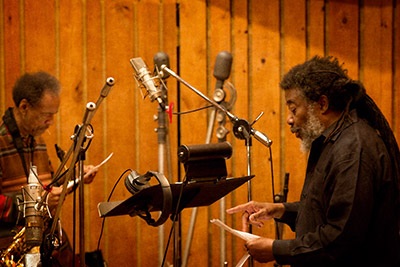
Zooid is one of Threadgill´s latest actively performing and recording groups and originally included guitar (Liberty Ellman), oud (Tarik Benbrahim), cello (Dana Leong), tuba (Jose Davila) and drums (Dafnis Prieto) along with the leader´s woodwinds (Up Popped The Two Lips in 2001, Pop Start The Tape, StoP in 2005, This Bring Us To, Volume I and Volume II in 2008, Tomorrow Sunny / The Revelry, Spp in 2011, In For A Penny, In For A Pound in 2014 and Poof in 2021).
Another recent group is Henry Threadgill Ensemble Double Up, which includes two alto saxophonists, a cellist, a tubist, two pianists and a drummer playing Threadgill´s compositions under his leadership (Old Locks And Irregular Verbs in 2015 and Double Up, Plays Double Plays in 2017). In 2017, Threadgill recorded Dirt … And More Dirt, an album comprised of two extended compositions, with his 14 or 15 Kestra: Agg featuring 15 musicians.
In recent years, Threadgill has also led the WindString Ensemble, which includes saxophone, violin, viola, cello and tuba, another section-based group he calls 3+3, with three cellos, tuba, drums and his flute and saxophone, and a marching band. His twenty-some-member Society Situation Orchestra has performed infrequently in the United States and abroad.
Over the years, much of Threadgill´s work has gone unrecorded, sometimes by choice, as he has always preferred the interaction and unpredictability of live performances. His sideman performances and recordings have also been rare in the last three decades, with Billy Bang´s Vietnam project (Vietn*m: Reflections in 2004), the Great Lakes Quartet (The Great Lakes Suites, TUM CD 041-2, in 2012) and Jack DeJohnette´s album dedicated to their shared hometown (Made In Chicago in 2013) being among the few notable exceptions.
Threadgill´s compositional output is broad ranging and he has written pieces for symphony and chamber orchestras, saxophone quartet, organ and orchestra, and an ensemble he conducts called Aggregation Orb, which includes French horn, clarinet, violin, viola, cello, acoustic guitar, oud, tuba, hand drums, drum set, vibraphone/marimba and vocals, among others. Two of Threadgill´s orchestral compositions, 1987´s "Run Silent, Run Deep, Run Loud, Run" and 1993´s "Mix for Orchestra," premiered at the Brooklyn Academy of Music in New York City. His many commissions have included those for Mordine & Co. Dance Theater, Carnegie Hall, the New York Shakespeare Festival, Talujon Percussion Ensemble, Junge Philharmonic Salzburg Orchestra, the Biennale di Venezia and the American Composers Orchestra. He has been composer in residence at University of California in Berkeley and the Atlantic Center of the Arts. In 2018, the Kronos Quartet recorded Threadgill´s composition "Sixfivetwo" as part of its Fifty for the Future project, a free library of 50 contemporary works.
Threadgill has received numerous awards throughout his career, including the Guggenheim Fellowship in 2003, the United States Artists Fellowship in 2008, the Copland House Residency Award in 2009, the Doris Duke Impact Award in 2015, the Doris Duke Artist Award in 2016, the Pulitzer Prize for Music for his album In For A Penny, In For A Pound in 2016 and the NEA Jazz Masters Fellowship in recognition of lifetime achievement in 2021. In March 2021, he was inducted into the American Academy of Arts and Letters.
...
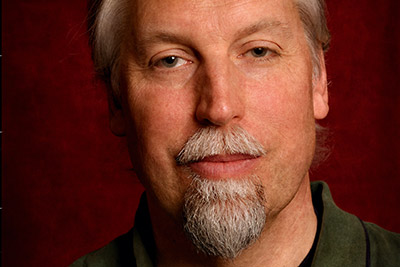
John Lindberg (b.1959) was born in Detroit, Michigan, and grew up in the towns of Royal Oak and Marshall in Southern Michigan. He began playing percussion in school marching bands at the age of ten, moving to the drum set at the age of 14 after being inspired by a friend´s jazz album collection, which ranged from Louis Armstrong to the Art Ensemble of Chicago. Having shortly thereafter requested for a double bass at school, Lindberg dedicated himself to that instrument and to the study of creative music, including with saxophonist Roscoe Mitchell who lived nearby. Rather than finishing high school, at the age of sixteen, Lindberg chose to pursue a professional career in music, leaving his family home and beginning the life of a working musician. Among his early teachers at the Creative Music Studio in Woodstock, New York, in the mid-1970s were bassists Dave Holland and David Izenson, with the latter also becoming an important mentor to Lindberg.
After settling in New York City, Lindberg played with saxophonists Frank Lowe (Lowe & Behold in 1977) and Marion Brown as well as in the Human Arts Ensemble alongside trombonist Joseph Bowie, saxophonist Luther Thomas, guitarist James Emery and drummer Charles "Bobo" Shaw (Junk Trap and Live In Trio Performances, Volume 1. in 1978). He also became a member of saxophonist Anthony Braxton´s quartet and other ensembles from 1978 until 1985 (Creative Orchestra (Koln) and Orchestra (Paris) in 1978, Performance 9-1-79 and Seven Compositions in 1979, Six Duets in 1982, Four Compositions (Quartet) in 1983 and Six Compositions (Quartet) and Prag 1984 (Quartet Performance) in 1984).
In 1977, Lindberg, James Emery and violinist Billy Bang co-founded the String Trio of New York, which quickly became both critically acclaimed and highly popular with international audiences (First String in 1979, Area Code 212 in 1980, Common Goal in 1981, Rebirth Of A Feeling in 1983 and Natural Balance in 1986). After Bang left to lead his own groups, the violin seat in the trio has been occupied by a succession of other fine violinists, including Charles Burnham (String Trio Of New York & Jay Clayton in 1987, Ascendant in 1990 and Time Never Lies in 1991), Regina Carter (Intermobility in 1992, Octagon in 1992, An Outside Job and Blues...? in 1993 and String Trio Of New York with Anthony Davis in 1996), Diane Monroe (Faze Phour in 1997) and, in the new millennium, Rob Thomas (Gut Reaction in 2001, Frozen Ropes in 2004 and The River Of Orion: 30 Years Running in 2007).
From 1980 to 1983, Lindberg lived in Paris, performing with reed players John Carter, Tony Coe (Tournee Du Chat in 1982), Steve Lacy and Keshavan Maslak (Loved By Millions in 1980 and Big Time in 1981), among many others. He also formed a trio with saxophonist Jimmy Lyons and drummer Sunny Murray (Jump Up/What To Do About in 1980).
Lindberg´s compositions have been featured on more than 50 recordings by groups led or co-led by him. These include Duo (with Billy Bang) in 1979, Comin´ And Goin (solo) in 1980, Unison (with Marty Ehrlich) and Dimension 5 (with Bang, Ehrlich, Hugh Ragin and Thurman Barker) in 1981, Team Work (with Ragin) and Give And Take (with George Lewis and Barry Altschul) in 1982, Haunt Of The Unresolved (with Ragin and Ehrlich) and The East Side Suite (with John Carter and Eric Watson) in 1983, Trilogy Of Works For Eleven Instrumentalists (large ensemble conducted by Anthony Braxton) and Relative Reliability (with Ehrlich and Barker) in 1984, Shoot First (with Eric Watson) in 1989, Luminosity (solo) and Dodging Bullets (with Albert Mangelsdorff and Watson) in 1992, Quartet Afterstorm (with Mangelsdorff, Watson and Ed Thigpen) in 1994, Resurrection Of A Dormant Soul (with Mangelsdorff, Watson and Thigpen) in 1995, Bounce (with Dave Douglas, Larry Ochs and Thigpen) in 1997, The Catbird Sings (with Wadada Leo Smith, Ochs and Andrew Cyrille) in 1999, A Tree Frog Tonality (with Smith, Ochs and Cyrille) in 2000, Two By Five (with the Ann Arbor String Quartet) in 2001, Ruminations Upon Ives And Gottschalk (with Baikida Carroll, Steve Gorn and Susie Ibarra) in 2001 and Winter Birds (with Carroll, Gorn and Ibarra) in 2003/4.
More recently, Lindberg has performed with his trio, BLOB, which also features guitarist Ted Orr and drummer Harvey Sorgen as well as occasional guests (The Awakening in 2007, Halloween and Quantum Fugue in 2008, Earphonious Swamphony and You Can´t Get There From There in 2009, A Night At The Opera and Metalshop in 2010, BLOB Goes To Mars and Third Ear in 2011 and Summer Shorts in 2012). Lindberg has also performed and recorded with Tripolar, with saxophonist Don Davis and drummer Kevin Norton ((a)live at Roulette, NYC, in 2011), the genre-busting trio JazzHopRevolution, with lyricist/hip hop artist Rahman Jamal and drummer Tani Tabbal (The Sound of Truth in 2007), John Lindberg Raptor Trio, with baritone saxophonist Pablo Calogera and drummer Joe LaBarbera (Western Edges in 2012), and John Lindberg BC3, with clarinetist Wendell Harrison and Kevin Norton (Born In An Urban Ruin in 2016).
In recent years, Lindberg has also been part of groups led by Karl Berger (Stillpoint in 2001/02 as well as a duo album Duets 1 in 2004), Susie Ibarra (Flower After Flower in 2000), Kevin Norton (Intuitive Structures in 2002 and Time-Space Modulator in 2004), vocalist Sheila Landis (Driven in 2004 and Heart Plaza in 2006), vocalist Judi Silvano (Cleome - Live Takes in 2008) and Roswell Rudd (The Incredible Honk in 2011), among others.
For nearly two decades, Lindberg has been a member of Wadada Leo Smith´s various ensembles, most notably the Silver Orchestra (Lake Biwa in 2004), the Golden Quartet (Tabligh in 2005), the Golden Quintet (Spiritual Dimensions - Disc 1 in 2008), Organic (Spiritual Dimensions - Disc 2 in 2008 and Heart´s Reflections in 2010) and the Great Lakes Quartet (The Great Lakes Suites, TUM CD 041-2, in 2012). He has also been featured on a number of Smith´s recordings of extended compositions, including Ten Freedom Summers in 2011, Occupy The World (TUM CD 037-2) in 2012 and America´s National Parks in 2016 and performed and recorded in a duo with Smith (Celestial Weather, TUM CD 046 in 2012).
Lindberg has composed more than 150 pieces, including a number of extended works that have been commissioned by a variety of ensembles and organizations, such as the New York Chamber Ensemble, the Pittsburgh New Music Ensemble, WDR Radio, Leonardo String Quartet, Bermuda Triangle and Wiener Musik Galerie. He has also long been active in music education.
...
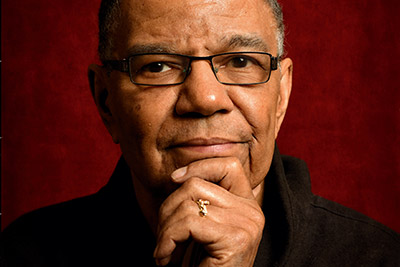
Jack DeJohnette (b.1942) was born in Chicago and grew up in a family where music had a high priority. Beginning at the age of four, he studied classical piano at the Chicago Conservatory of Music, then added the drums to his repertoire when he joined his high school concert band at the age of 14.
By the mid-1960s, DeJohnette had entered the Chicago jazz scene - not just as a leader of his own groups, but also as a sideman on both piano and drums. He experimented with rhythm, melody and harmony as part of the AACM during the organization´s early days, and later drummed alongside Rashied Ali in the John Coltrane Quintet.
Although DeJohnette´s first published recording was with saxophonist Jackie McLean (Jacknife in 1965; also Demon´s Dance in 1967), he began garnering international recognition during his tenure with the Charles Lloyd Quartet (with saxophonist Charles Lloyd, pianist Keith Jarrett and bassist Cecil McBee or Ron McLure; Dream Weaver, Forest Flower and In Europe in 1966, Love-In - At The Fillmore and In The Soviet Union in 1967, and Soundtrack in 1968), one of the first jazz groups to receive true crossover attention.
DeJohnette soon also began performing and recording with the likes of pianist Herbie Hancock (Blow-Up in 1966), guitarist Jerry Hahn (Ara-be-in in 1967), saxophonist Joe Henderson (Tetragon in 1968, Power To The People in 1969, Black Is The Colour in 1972, Multiple in 1973 and Black Narcissus in 1974), pianist Cedar Walton (Spectrum in 1968), pianist Bill Evans (At The Montreux Festival in 1968), pianist Bobby Timmons (Do You Know The Way in 1968), saxophonist Lee Konitz (Peacemeal in 1968 and Satori in 1974), saxophonist Eric Kloss (Sky Shadows in 1968, To Hear Is To See in 1969 and Consciousness in 1970), pianist Chick Corea (Is in 1969 and The Sun in 1970), saxophonist Wayne Shorter (Super Nova in 1969), bassist Miroslav Vitous (Infinite Search in 1969), saxophonist Joe Farrell (Joe Farrell Quartet in 1970 and Moongerms in 1972), trumpeter Freddie Hubbard (Straight Life in 1970, First Light in 1971 and In Concert, Vol 1 & 2 in 1973), guitarist George Benson (Beyond The Blue Horizon in 1971 and Body Talk in 1973), pianist/harpist Alice Coltrane (Universal Consciousness in 1971 and, with guitarist Carlos Santana, Illuminations in 1974), flutist Hubert Laws (The Rite Of Spring in 1971), vibraphonist Bobby Hutcherson (Natural Illusions in 1972), saxophonist Sonny Rollins (Next Album in 1972), bassist Richard Davis (Song For The Wounded Knee in 1973), saxophonist Paul Desmond (Skylark in 1973), saxophonist David Liebman (First Visit in 1973), trumpeter Enrico Rava (Pupa O Crisalide and Quotation Marks, both in 1973) and trumpeter Luis Gasca (Born To Love You in 1973), among others, thereby beginning one of the most extensive recording careers in modern jazz.
In 1968, DeJohnette joined Miles Davis´s group shortly before the recording of Bitches Brew, an album that triggered a seismic shift in jazz and permanently changed the direction of the music. DeJohnette stayed with Davis for three years, making important contributions to a number of Davis recordings, including Big Fun, Black Beauty, Live At The Fillmore East, Live/Evil and The Cellar Door Sessions in 1970, A Tribute To Jack Johnson in 1971 and On The Corner in 1972.
During this same period, DeJohnette also recorded his first albums as a leader, including The DeJohnette Complex (with saxophonist Bennie Maupin, pianist Stanley Cowell, Miroslav Vitous and drummer Roy Haynes) in 1968, Have You Heard? (with Maupin, pianist Hideo Ichikawa and bassist Gary Peacock) in 1970, Sorcery (with Maupin, trombonist Michael Fellerman, guitarists John Abercrombie and Mike Goodrich, and bassist Dave Holland) in 1974 and Cosmic Chicken (with saxophonist Alex Foster, John Abercrombie and bassist Peter Warren) in 1975.
In the early 1970s, DeJohnette recorded twice with the group Compost that included him mostly on keyboards, saxophonist Harold Vick, bassist Jack Gregg, drummer Bob Moses and percussionist Jumma Santos (Take Off Your Body in 1971 and, with guitarists Roland Prince and Ed Finney as well as vocalists Lou Courtney and Jeanne Lee, Life Is Round in 1973).
DeJohnette has also occasionally recorded as a pianist, including trio recording Jackeyboard (with bassist Mitsuaki Furuno and drummer George Ohtsuka) in 1973 and solo recordings Cosmic Chicken in 1975 and Return in 2015.
The mid-1970s were marked by a series of short-lived groups and projects - many of them leaning toward the more experimental side of jazz, including The Gateway Trio (featuring Dave Holland and John Abercrombie; Gateway in 1975 and Gateway 2 in 1977 as well as Homecoming and In the Moment in 1994), Directions (with Abercrombie, Alex Foster et. al.; Directions in 1975 and Untitled in 1976) and New Directions (with Abercrombie, trumpeter Lester Bowie and bassist Eddie Gomez; New Directions in 1978 and New Directions in Europe in 1979). These were followed by Special Edition, which helped launch the careers of several lesser-known musicians, such as saxophonists Arthur Blythe, Chico Freeman, David Murray and John Purcell as well as bassist Rufus Reid, and remained active for almost two decades, with some personnel changes along the way (Special Edition in 1976, Tin Can Alley in 1980, Inflation Blues in 1982, Album Album in 1984, Irresistible Forces in 1987, Audio-Visualscapes in 1988, Earth Walk in 1991 and Extra Special Edition in 1994), although the group´s schedule was frequently interrupted by DeJohnette´s various collaborative ventures and other commitments.
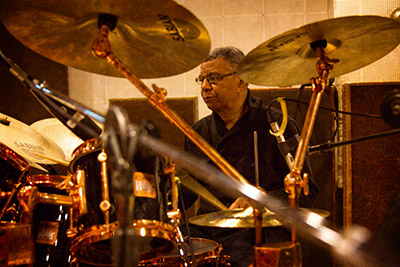
Over the years, DeJohnette has recorded numerous duo albums including with Keith Jarrett (Ruta And Daitya in 1971), Dave Holland (Time & Space in 1973), saxophonist John Surman (The Amazing Adventures of Simon Simon in 1981 and Invisible Nature in 2000), Lester Bowie (Zepra in 1985), guitarist Bill Frisell (The Elephant Sleeps But Still Remembers in 2001), Gambian kora player Foday Musa Suso (Music From The Heart Of The Masters in 2002) and Wadada Leo Smith (America in 2008).
Alongside his own groups and other projects, DeJohnette has worked extensively with Keith Jarrett as part of a longstanding trio also including Gary Peacock. In a rare feat for a modern jazz group, this trio celebrated its 30th anniversary in 2013. The trio´s first recording session took place in 1983 producing Standards, Volume 1 and Volume 2 as well as Changes, and their oeuvre totals at least 20 recordings.
Another of DeJohnette´s high-profile projects in the early 1990s was a trio with Herbie Hancock and guitarist Pat Metheny (Parallel Realities in 1990), which developed into a touring quartet also including Dave Holland (Parallel Realities Live in 1990). In 1992, DeJohnette released Music For A Fifth World, an album inspired by Native American culture that included appearances by guitarists Vernon Reid and John Scofield, among others.
In the new millennium, DeJohnette performed with the Jack DeJohnette Quartet, featuring pianist Danilo Perez, bassist John Patitucci and bassist/guitarist Jerome Harris, and a trio with Perez and Patitucci (Music We Are in 2008) as well as the Trio Beyond, a group that celebrated the music of Tony Williams, featuring John Scofield and bassist Larry Goldings (Sausades in 2004).
Among DeJohnette´s most recent recordings as a leader are Sound Travels (2011), a genre-spanning album that features guest players such as Esperanza Spalding, Bobby McFerrin, Bruce Hornsby and Jason Moran, Made In Chicago (2013) dedicated to his hometown and featuring three elders of the AACM, Muhal Richard Abrams, Roscoe Mitchell and Henry Threadgill, as well as the legendary Chicago bassist Larry Gray and In Movement (2015) with his own trio featuring saxophonist Ravi Coltrane and bassist Matthew Garrison.
Although identified by many with his most high-profile associations, such as Miles Davis, Herbie Hancock and Keith Jarrett, DeJohnette has always stayed true to his roots in the creative music of Chicago in the 1960s as evidenced by the personnel of many of his own groups and recordings as well as his collaborations with the likes of Ornette Coleman and Pat Metheny (Song X in 1985), David Murray (In Our Style in 1986), Dave Holland (Triplicate in 1988), Gary Thomas (Exile´s Game in 1993), the World Saxophone Quartet (Selim Sivad in 1998), Don Byron (Romance With The Unseen in 1999 and Ivey-Divey in 2004), John Surman (Free And Equal in 2001, Hybrids in 2005 and Brewster´s Rooster in 2007) and Michel Portal (Ballador in 2010), among many others.
For over two decades, DeJohnette has also performed with Wadada Leo Smith, with whom he first played in Chicago in the late 1960s during an informal trio session at the invitation of Muhal Richard Abrams. DeJohnette was one of the original members of Smith´s Golden Quartet (with Anthony Davis and Malachi Favors Maghostut; Golden Quartet in 2000 and The Year of the Elephant in 2002) and also recorded a highly acclaimed duo album with Smith (America in 2008). In 2012, he participated in the first recording by the Great Lakes Quartet (The Great Lakes Suites, TUM CD 041-2).
In a career that spans six decades and includes collaborations with some of the most iconic figures in modern jazz, DeJohnette has established an unchallenged reputation as one of the greatest drummers in the history of the genre. In addition to those mentioned above, the list of creative associations throughout his career also includes Chet Baker, Gary Bartz, Joanne Brackeen, Michael Brecker, Kenny Burrell, Gary Burton, Betty Carter, Eliane Elias, Stan Getz, Hank Jones, Steve Khan, Eero Koivistoinen, Steve Kuhn, Harold Mabern, Thelonious Monk, Milton Nascimento, Gonzalo Rubalcaba, Mike Stern, Steve Swallow, Stanley Turrentine, McCoy Tyner, Bennie Wallace and Kenny Wheeler, among many others. Along the way, he has developed a versatility that allows room for hard bop, rhythm ‘n´ blues, world music, avant-garde and just about every other style to emerge in the past six decades.
Marking his 70th birthday in 2012, DeJohnette received from the National Endowment for the Arts the NEA Jazz Masters Fellowship, the highest U.S. honor for a jazz musician, in recognition of his extraordinary life achievements, his contributions to advancing the jazz art form and for serving as a mentor for a new generation of aspiring young jazz musicians. In 2012, he also received the United States Artists Fellowship.
...
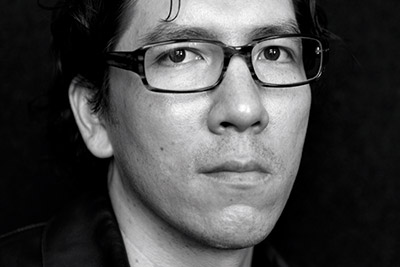
Jonathon Haffner (b.1977) grew up in California where he began playing the saxophone at an earlier age and studied the instrument with late Phil Sobel.
After moving to New York City in 1999, Haffner and a long-time friend drummer Kenny Wollesen started the group Himalayas. Soon after, Haffner also began performing regularly with the ensemble Now We Are Here, led by filmmaker Jonas Mekas.
During his years in New York City, Haffner has also performed and/or recorded with Butch Morris, Bill Frisell, Steven Bernstein, Louis Cole, KNOWER, Medeski, Martin and Wood, Uri Caine, Jim Black, Eddie Henderson, Sex Mob, Jesse Harris, Brazilian Girls, Brian Blade, Graham Haynes, The Nublu Orchestra, Ilhan Ersahin, Elliott Sharp and Rickie Lee Jones, among many others.
In recent years, Haffner has been a member of Wadada Leo Smith´s Great Lakes Quartet, including performances at the Jazzfest Berlin in Germany in November 2016, The Stone in New York City in April 2017 and the International Jazzfestival Leibnitz in Austria in September 2018.
In 2009, Haffner released Life On Wednesday (pianist Craig Taborn, guitarist Wayne Grantz, bassist Eivind Opsvik, drummer Jochen Rueckert and Kenny Wollesen), his first album as a leader that was produced by David Binney.
In 2014, an ensemble co-led by Haffner with Kenny Wollesen and drummer Dalius Naujo released Rasa Rasa, an album featuring six Lithuaninan singers performing arrangements of ancient polyphonic vocal music of Lithuania, among others.
In 2021, the collective ensemble Big Shapes released their first album, Big Shapes Vol 1, as part of a scheduled four-album series. In addition to Haffner, the ensemble includes drummer Max Jaffe, guitarist Jonathan Goldberger and multi-instrumentalist Dave Harrington of Darkside.
Also in 2021, Rocket Sci, a new quartet including Haffner, bassist Tony Scherr, Kenny Wollesen and Dalius Naujo, is scheduled to release its first album, Bond Riviera.
...
